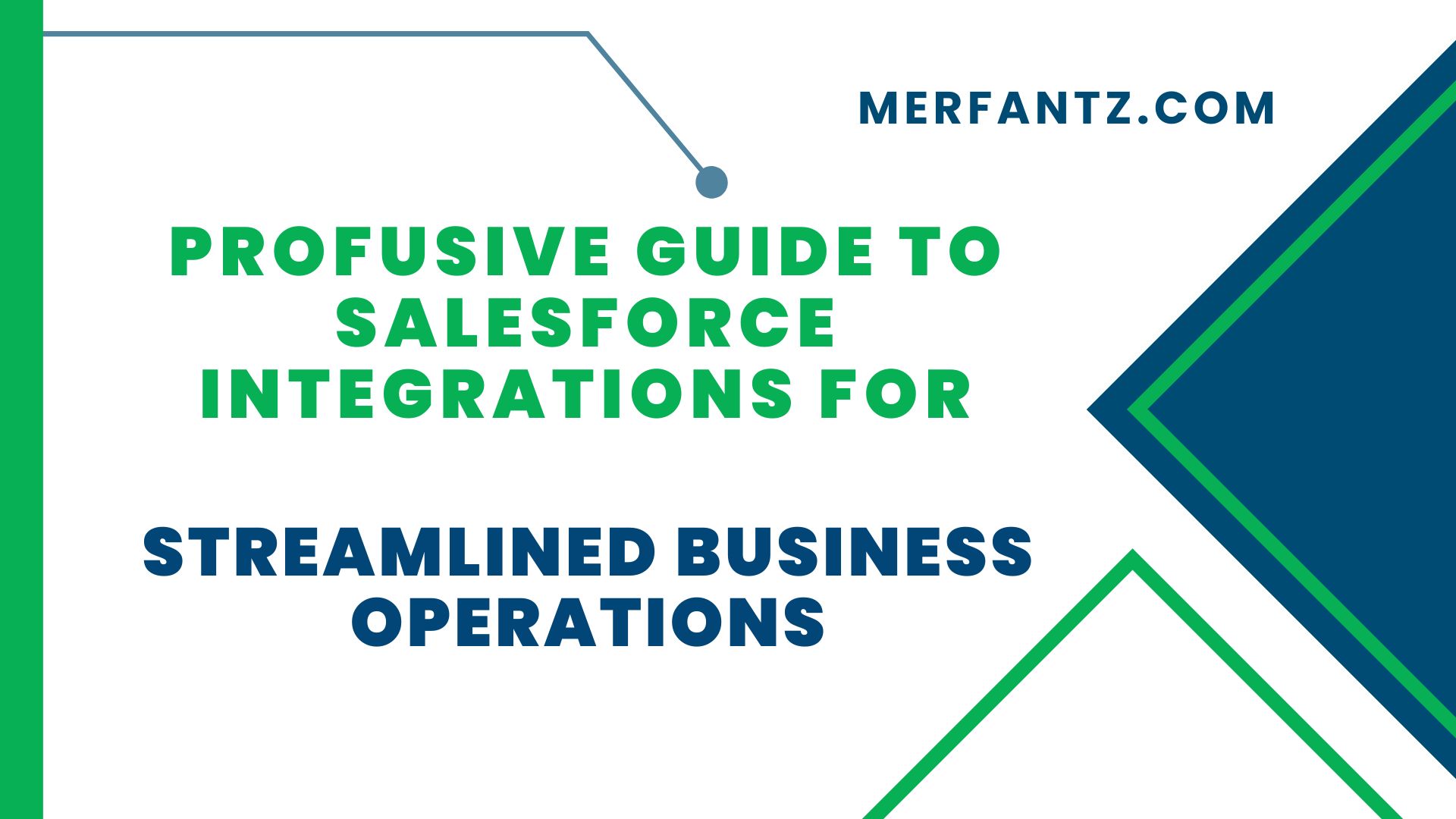Introduction:
In today’s fast-paced business landscape, seamless data management and efficient processes are key to staying competitive. Salesforce integration solutions offer a comprehensive approach to streamline your business operations and drive growth. In this guide, brought to you by Merfantz Technologies, we will explore the importance of Salesforce integration, its key benefits, and how it can revolutionize your sales processes, customer relationship management, and data synchronization. We will also provide valuable insights on selecting the right integration solution for your business, best practices for seamless operations, maximizing ROI, and overcoming common challenges. Let’s dive in!
Why Salesforce Integration is Crucial for Business Efficiency
Salesforce, a leading customer relationship management (CRM) platform, offers a wide range of features and capabilities. However, many businesses face challenges when it comes to integrating Salesforce with their existing systems, such as ERP, marketing automation, or e-commerce platforms. This lack of integration often leads to data silos, manual data entry, and inefficient processes. By integrating Salesforce with your other business systems, you can eliminate these issues and achieve a unified and streamlined workflow.
Salesforce integration plays a crucial role in business efficiency by enabling real-time data synchronization across systems. This integration empowers your teams with up-to-date and accurate information, eliminating the need for manual data entry and reducing errors. It also provides a 360-degree view of your customers, allowing your sales and customer support teams to access relevant data seamlessly. With a consolidated view of customer interactions, you can personalize engagements, improve response times, and enhance overall customer satisfaction.
Key Benefits of Salesforce Integration Solutions
Salesforce integration solutions offer numerous benefits that can significantly impact your business operations. Firstly, they enable enhanced data visibility and accessibility. By integrating Salesforce with your other systems, you can centralize data and ensure that everyone in your organization has access to the right information at the right time. This improves collaboration, decision-making, and overall operational efficiency.
Another key benefit of Salesforce integration is process automation. By automating data sync and eliminating manual entry, you can save valuable time and resources. This automation streamlines workflows, reduces errors, and allows your teams to focus on more strategic tasks. Furthermore, integration enables seamless lead and opportunity management, ensuring that your sales team can efficiently track and nurture leads throughout the sales pipeline.
Streamlining Sales Processes with Salesforce Integration
Salesforce integration provides significant advantages in streamlining your sales processes. By integrating Salesforce with your marketing automation platform, you can seamlessly transfer leads, contacts, and campaign data between systems. This integration allows your sales team to access comprehensive prospect information, gain insights into lead behavior, and prioritize their efforts effectively.
Moreover, integrating Salesforce with your e-commerce platform enables smooth order management and inventory synchronization. It ensures that your sales team has real-time visibility into product availability, pricing, and order status, allowing them to deliver exceptional customer experiences. The integration also facilitates order fulfillment and customer support, creating a seamless end-to-end sales process.
Enhancing Customer Relationship Management (CRM) with Salesforce Integration
Customer relationship management lies at the core of every successful business. Salesforce integration enables you to enhance your CRM capabilities by consolidating customer data from various touchpoints. Integrating Salesforce with your email marketing software, for instance, allows you to track email interactions, automate follow-ups, and deliver targeted campaigns based on customer preferences and behavior.
Furthermore, integrating Salesforce with your customer support system ensures that your support agents have complete visibility into customer cases, inquiries, and interactions. This integration enables a unified customer service experience, improves response times and enhances customer satisfaction. By leveraging the power of integrated CRM, you can build stronger relationships with your customers and drive loyalty.
Automating Data Sync and Eliminating Manual Entry with Salesforce Integration
One of the significant advantages of Salesforce integration is the ability to automate data synchronization across systems. Manual data entry is not only time-consuming but also prone to errors. By integrating Salesforce with your ERP, for example, you can automatically sync customer, order, and financial data, eliminating the need for manual intervention and ensuring data accuracy.
Moreover, Salesforce integration enables bi-directional data flow, ensuring that updates made in one system reflect in real-time across all integrated platforms. This synchronization improves data consistency, reduces duplication, and eliminates data silos. With automated data sync, your teams can access the most recent and accurate information, empowering them to make informed decisions and deliver exceptional customer experiences.
Choosing the Right Salesforce Integration Solution for Your Business
Selecting the right Salesforce integration solution is crucial for successful implementation. It’s essential to consider factors such as your existing systems, integration complexity, scalability, security, and future business needs. Partnering with a trusted integration provider like Merfantz Technologies can simplify the selection process, as they can assess your requirements, recommend the best integration approach, and ensure a seamless integration experience.
At Merfantz Technologies, we offer a range of Salesforce integration solutions tailored to meet your unique business needs. Whether you require integration with ERP, marketing automation, e-commerce, or other systems, our experienced team can design and implement a robust integration strategy that maximizes your operational efficiency and drives business growth.
Salesforce Integration Best Practices for Seamless Operations
To ensure a successful Salesforce integration, it’s important to follow best practices. Firstly, clearly define your integration goals and objectives. Understand the specific data, processes, and workflows that need to be integrated and prioritize them accordingly. Thoroughly assess your existing data quality and take necessary steps to clean and standardize your data before integration.
Additionally, establish a well-defined data governance framework to maintain data integrity and security throughout the integration process. Regularly monitor and audit your integrated systems to identify and resolve any issues promptly. Lastly, provide comprehensive training to your teams to ensure they understand the integrated workflows and can effectively utilize the integrated system’s capabilities.
Maximizing ROI with Salesforce Integration
Salesforce integration offers a significant return on investment (ROI) when implemented strategically. To maximize your ROI, it’s essential to define key performance indicators (KPIs) and continuously measure the impact of integration on your business. Monitor metrics such as increased sales productivity, reduced data entry time, improved customer satisfaction, and streamlined processes to evaluate the effectiveness of your integration solution.
Furthermore, regularly analyze your integrated system’s performance and identify opportunities for optimization. Leverage advanced reporting and analytics tools within Salesforce to gain insights into customer behavior, sales trends, and operational efficiency. By continuously fine-tuning your integration strategy, you can ensure ongoing ROI and drive long-term business success.
Overcoming Common Challenges in Salesforce Integration
While Salesforce integration offers numerous benefits, it can present challenges during implementation. Common challenges include data mapping and transformation, system compatibility, data security, and user adoption. Partnering with an experienced integration provider like Merfantz Technologies can help you overcome these challenges by leveraging their expertise, best practices, and proven methodologies.
At Merfantz Technologies, we have extensive experience in Salesforce integration and can guide you through the entire integration journey. Our team of experts will ensure smooth data mapping and transformation, address system compatibility issues, implement robust security measures, and provide comprehensive user training and support.
Success Stories: Realizing Business Growth through Salesforce Integration Solutions
Many businesses have achieved remarkable growth and success by leveraging Salesforce integration solutions. By integrating their systems and streamlining their operations, they have improved efficiency, accelerated sales cycles, enhanced customer experiences, and gained a competitive edge in the market. Explore our success stories to learn how companies across various industries have transformed their business with Salesforce integration solutions.
FAQ – Salesforce Integration Solutions
What is Salesforce integration?
Salesforce integration refers to the process of connecting Salesforce, a leading customer relationship management (CRM) platform, with other business systems such as ERP, marketing automation, or e-commerce platforms. It enables the seamless flow of data and information between systems, eliminating data silos and streamlining business operations.
Why is Salesforce integration crucial for business efficiency?
Salesforce integration is crucial for business efficiency because it enables real-time data synchronization, eliminates manual data entry, and provides a unified view of customer interactions. By integrating Salesforce with other systems, businesses can enhance collaboration, decision-making, and operational efficiency.
What are the benefits of Salesforce integration solutions?
Salesforce integration solutions offer several benefits, including enhanced data visibility and accessibility, process automation, improved lead and opportunity management, and streamlined sales processes. They also enable better customer relationship management (CRM) by consolidating customer data from various touchpoints.
How does Salesforce integration streamline sales processes?
Salesforce integration streamlines sales processes by seamlessly transferring leads, contacts, and campaign data between Salesforce and other marketing automation platforms. It also facilitates order management and inventory synchronization with e-commerce platforms, creating a smooth end-to-end sales process.
What is streamline in Salesforce?
Streamline in Salesforce refers to the process of optimizing and simplifying business operations within the Salesforce platform, eliminating unnecessary steps and automating tasks to improve efficiency.
What are the ways to integrate with Salesforce?
There are multiple ways to integrate with Salesforce, including using Salesforce APIs (such as SOAP, REST, or Bulk APIs), utilizing pre-built connectors and middleware tools, or leveraging Salesforce AppExchange to connect with third-party applications.
What is the most common integration with Salesforce?
The most common integration with Salesforce is integrating with a company’s CRM, marketing automation, or ERP systems. These integrations ensure seamless data flow between Salesforce and other essential business applications.
What are the benefits of Salesforce integration with business applications?
Salesforce integration with business applications offers several benefits, such as enhanced data visibility, streamlined processes, improved collaboration, real-time data synchronization, increased efficiency, and the ability to provide a unified view of customers across systems. This integration enables businesses to make better-informed decisions and deliver exceptional customer experiences.
Conclusion:
Salesforce integration is a game-changer for businesses aiming to streamline their operations and drive growth. By integrating Salesforce with your existing systems, you can achieve data synchronization, process automation, and enhanced CRM capabilities. Choose the right integration solution, follow best practices, and overcome common challenges to maximize your ROI. Partner with Merfantz Technologies, an experienced Salesforce integration provider, to unlock the full potential of streamlined business operations and propel your company towards success.
Author Bio
Co-Founder & CMO at Merfantz Technologies Pvt Ltd | Marketing Manager for FieldAx Field Service Software | Salesforce All-Star Ranger and Community Contributor | Salesforce Content Creation for Knowledge Sharing






